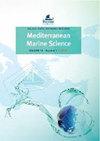Patterns of Posidonia oceanica (L.) Delile tannin cells and leaf characteristics according to environmental conditions
IF 2.3
3区 环境科学与生态学
Q1 MARINE & FRESHWATER BIOLOGY
引用次数: 0
Abstract
There is little research on the distribution and evolution of tannin cells, specialized in the sequestration of phenolic compounds, in the leaves of P. oceanica, depending on the developmental stage and environmental conditions. This work aims to evaluate the density of tannin cells along the vertical axis of leaves (basal, middle, and apical regions) at four sites corresponding to an anthropogenic gradient estimated from the ecological status of P. oceanica meadows: Moderate (El Djamila), Good (Bou Ismaïl) and very good (Kouali and Aïn Tagouraït). Leaf thickness and width were measured in each region to express the density of tannin cells per mm². Data analysis shows that the density of tannin cells decreases with increasing leaf age and that the highest densities are recorded in the apical regions, especially when the leaf apex is entire. The density of leaf tannin cells is significantly correlated (R = -0.977, p = 0.022) with the Ecological Quality Ratio (EQR) corresponding to the ecological status of P. oceanica meadows and reflecting the impact of environmental pressures. This sensitivity to environmental conditions opens interesting prospects for using tannin cell density as a descriptor (environmental biomarker) in coastal monitoring programs based on P. oceanica meadows.大洋波西多尼亚的分布模式(L.)根据环境条件调整单宁细胞和叶片特征
单宁细胞在大洋藻叶片中具有固定酚类化合物的功能,其在不同发育阶段和环境条件下的分布和演化研究较少。这项工作旨在评估四个地点的单宁细胞密度沿叶片垂直轴(基部,中部和顶端区域),这些地点对应于从海洋草甸生态状况估计的人为梯度:中等(El Djamila),良好(Bou Ismaïl)和非常好(Kouali和Aïn Tagouraït)。测量每个区域的叶片厚度和宽度,以表示每mm²的单宁细胞密度。数据分析表明,单宁细胞密度随叶龄的增加而降低,且单宁细胞密度在叶尖区域最高,尤其是叶尖完整时。单宁细胞密度与反映海洋草甸生态状况和环境压力影响的生态质量比(EQR)呈显著相关(R = -0.977, p = 0.022)。这种对环境条件的敏感性为将单宁细胞密度作为描述符(环境生物标志物)用于基于海洋草甸的海岸监测计划开辟了有趣的前景。
本文章由计算机程序翻译,如有差异,请以英文原文为准。
求助全文
约1分钟内获得全文
求助全文
来源期刊

Mediterranean Marine Science
MARINE & FRESHWATER BIOLOGY-
CiteScore
5.20
自引率
17.90%
发文量
34
审稿时长
>12 weeks
期刊介绍:
The journal Mediterranean Marine Science (MMS), published by the Hellenic Centre for Marine Research (HCMR), issues three volumes annually. The journal welcomes original research articles, short communications, New Mediterranean Biodiversity records, extended reviews, comments, and Theme sections in all fields of Oceanography, Marine Biology, Marine Conservation, Fisheries and Aquaculture in the Mediterranean area and the adjacent regions. All content is peer reviewed.
 求助内容:
求助内容: 应助结果提醒方式:
应助结果提醒方式:


